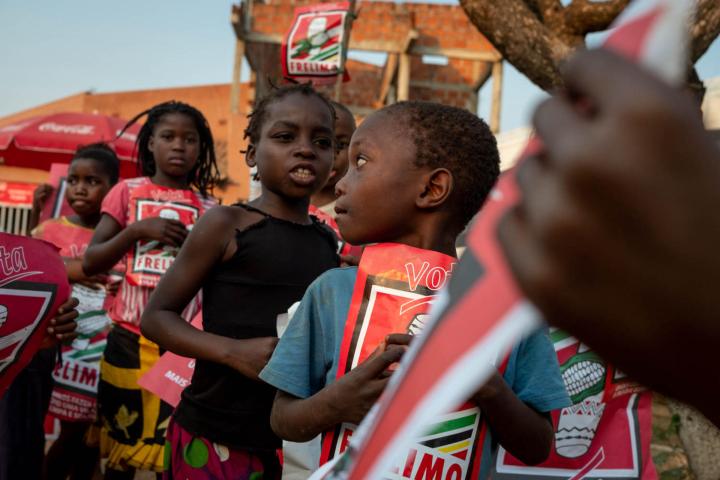ISS TODAY
The AU urges Mozambique to get its act together to uphold democracy

A new APRM report notes political intimidation and a lack of separation of powers in the country. By Liesl Louw-Vaudran
First published by ISS Today
Mozambique is under fire for not upholding democratic principles such as the separation of powers and for the continued political violence in the country. A new report by the African Peer Review Mechanism (APRM), an African Union (AU) organ, says the country is marked by “the prevalence of allegedly politically motivated intimidation, violence and killings”.
This is despite “significant progress” made to improve electoral systems since 2010, and “constitutes a major threat to peacebuilding”.
Following local elections in 2014, the opposition Mozambican National Resistance (Renamo) waged a low-level war against government forces. Renamo is unhappy about the centralisation of power in the hands of the ruling Mozambique Liberation Front (Frelimo), despite Renamo’s victory in several central and northern regions. Negotiations around a political solution in the run-up to presidential elections in October are ongoing.
This report comes as the country tries to show progress in its fight against corruption – a failure noted by the APRM report. On 16 February, Ndambi Guebuza, son of former president Armando Guebuza, was arrested in connection with a $2-billion corruption scandal that left the country heavily indebted through the purchase of fishing and naval vessels it couldn’t afford.
At the end of last year, former finance minister Manuel Chang was arrested in South Africa on a United States (US) arrest warrant related to the matter. Mozambique has asked for him to stand trial at home, rather than being sent to the US.
This could limit the fallout from the scandal allegedly linked to high-ranking government officials. The US accuses Chang of accepting $12-million of bribes to facilitate dodgy deals between Mozambican companies and a French-based shipping company.
There remains some doubt, however, whether this crackdown by Mozambican authorities will go all the way or if it’s just to impress the International Monetary Fund, which must decide whether to give new loans to Mozambique. Budget support to Mozambique was suspended after the discovery of the 2016 debt scandal.
The February 2019 APRM report on Mozambique is based on a visit by the APRM at the end of 2018 and was released at the 32ndAU summit in Addis Ababa. The report notes the threat of the insurgency that has plagued northern Mozambique since the end of 2017. It also notes the detrimental effect of the $2-billion debt scandal on the country’s economy.
It states that its investigative team “was left in no doubt that the judiciary and the legislature lack the combination of the administrative, human, financial and infrastructural capacity” needed for them to “exercise and undertake their respective constitutional countervailing and oversight powers and functions under the separation of powers effectively”.
Despite the AU’s criticism, Mozambique deserves some credit for opening itself up to continental scrutiny. It is one of the few APRM member states to undergo a second country review after the first one in 2009.
According to the APRM report, 62% of Mozambique’s citizens live below the poverty line of $1.90 a day, down from 69% in 2008. Obstacles to improving economic conditions across the board include regional inequalities and a “demographic explosion”. The Mozambican population almost doubled in the past decade – to 28-million.
This confirms the findings of an Institute for Security Studies’ African Futures report that rapid population growth is one of the main obstacles to Mozambique pulling itself out of underdevelopment. This is despite the promise of huge new investments thanks to major offshore gas finds in the north of the country.
The APRM has embarked on a new strategy to become more relevant and integrate its work with other AU structures. The timely publication of the Mozambique report, together with one on Côte d’Ivoire, is a clear step in the right direction. The APRM also produced a “state of governance” report to heads of state at the AU summit.
The two country reports were discussed in Addis Ababa in the presence of Mozambique’s President Filipe Nyusi, President Alassane Ouattara of Côte d’Ivoire, and a handful of leaders. This defeated the core purpose of the APRM – the peer reviewing of reports by all heads of state rather than just three or four of those who are implicated or interested in the process.
It can also be asked what will change from one country review to the next. Also, does the government really open up to AU investigators to such an extent that they can provide sufficient early warning of trouble that might be brewing?
The Mozambique document says a National Programme of Action from 2019 to 2024 has been drawn up by the government to address the challenges noted by the APRM. Many of the issues plaguing Mozambique, however, depend on political change.
Poverty and marginalisation in large parts of the country will probably continue if there is no real progress on the peace talks with Renamo, where the demobilisation and reintegration of fighters into the regular army hasn’t yet started.
Development plans could also be derailed if there is large-scale contestation in the run-up to the October elections. Conflict has arisen over the proposed new regional representation structures that would ensure centralised control, regardless of the outcomes of the polls in those regions.
The insurgency in the north, which some suspect is fuelled by illegal trafficking of heroin, timber, wildlife and rubies in the region, is also worrying. The radical jihadist groups steadily increased their attacks against Mozambicans throughout 2018. They have also recently been attacking workers building the liquefied natural gas installations in the Cabo Delgado province.
These are crises the government will have to urgently address because they threaten any long-term plans for Mozambique to graduate from being perpetually labelled a “post-conflict” country to that of a developing democracy. DM
Liesl Louw-Vaudran is a Senior Research Consultant, ISS

















 Become an Insider
Become an Insider